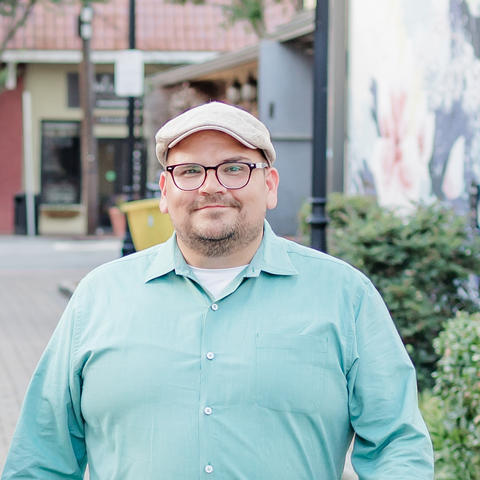
Section Branding
Header Content
Georgia Today: Arrests connected to 'Cop City' protests; Georgia charter schools; Shy spiders
Primary Content
On the Wednesday, May 31 edition of Georgia Today: Three people are arrested in connection with "Cop City"; questions are raised about charter schools and minority enrollment; and a new study finds the shyest spiders ever documented.

Peter Biello: Welcome to the Georgia Today podcast from GPB News. Today is Wednesday, May 31. I'm Peter Biello. On today's episode, three people are arrested in connection with the controversial police training center in Atlanta. Questions are raised about charter schools and minority enrollment. And a new study finds the shyest spiders ever documented. These stories and more are coming up on this edition of Georgia Today.
Story 1:
Peter Biello: State law enforcement officials have arrested three people involved in an organization that supports those protesting the planned police training center in Atlanta. The Georgia Bureau of Investigation says those arrested were officers of the Atlanta Solidarity Fund. That fund raises money to provide legal defense for protesters charged with domestic terrorism after a march rally at the site turned violent. Opponents called the arrests an "extreme provocation," comparing those arrested to people who bailed out civil rights activists in the 1960s. Gov. Brian Kemp says the fundraisers are part of a criminal operation.
Story 2:
Peter Biello: Five state university professors have lost their challenge to a Georgia law allowing weapons on campus. The state Supreme Court today upheld a lower court ruling dismissing their lawsuit. University of Georgia geography professor John Knox, a plaintiff in the case, says the ruling affirms the authority of the university system Board of Regents to make policies regarding guns on campus.
John Knox: The buck stops with the Board of Regents. And so the next step is to encourage the board to go for a more common-sense educational policy with regards to weapons.
Peter Biello: Knox says the policy allowing weapons on campus has some exceptions, including classes with dual-enrolled high school students.

Story 3:
Peter Biello: In another decision released today, the Supreme Court of Georgia decided for the second time that a 2016 law mandating licensing and regulation requirements for lactation consultants is unconstitutional. The law, first struck down in 2020, would have required lactation consultants to get certified in order to be paid for assisting breastfeeding mothers. The decision is the second win for DeKalb County-based organization Reaching Our Sisters Everywhere, which sued the Secretary of State in 2018. They argued the law was irrational and would have pushed people out of the profession. Though many lactation consultants in Georgia already pursue independent certification, others argue it can be costly or inaccessible for providers in low-income areas. The state Supreme Court's latest decision upholds that people have the right to work without, quote, "unreasonable government interference."
Story 4:
Peter Biello: Georgia has the nation's seventh highest rate of business failure in the first year. That's according to a new study by LendingTree. GPB's Sarah Kallis has more.
Sarah Kallis: About a quarter of businesses started in Georgia fail after one year, according to data from the U.S. Bureau of Labor Statistics. LendingTree chief credit analyst Matt Schultz says it is important for entrepreneurs to understand what is driving the statistics before starting their business.
Matt Schultz: So it really does drive home the need to be as planful as possible.
Sarah Kallis: The study also looked at five- and 10-year failure rates, where Georgia ranks 18 and 33 respectively. For GPB News, I'm Sarah Kallis.
Story 5:
Peter Biello: Atlanta is among the nation's bottom three metro areas for growth and worker earnings. That's according to a report on small business growth released yesterday by payroll and human resources provider Paychex. The company's report says Atlanta area hourly earnings grew by 3.6%, below the national average of 4.3%. Nationally, small business growth remained unchanged from April to May.
Story 6:
Peter Biello: A new study of adults in Georgia shows people grieving the death of a loved one are at greater risk of binge drinking than those not in bereavement, which can lead to potentially fatal consequences. GPB's Ellen Eldridge has more.
Ellen Eldridge: The research, published in the International Journal of Environmental Research and Public Health, is the first to look at the link between alcohol use and grief among adults in Georgia. Dr. Toni Miles is the lead author of the report. She says the CDC collects information related to health conditions and risky behaviors, but —
Toni Miles: Bereavement was a new thing. I finally begged a bunch of people for money and begged the Department of Public Health to put it on their survey. So we're the only state in the nation that has actually measured bereavement before the pandemic.
Ellen Eldridge: Miles says most commonly, binge drinkers were grieving the death of a friend, neighbor or more than three people. That's concerning, given the number of people killed by COVID. For GPB News, I'm Ellen Eldridge.

Story 7:
Peter Biello: Delta Airlines is being hit with a federal class action lawsuit over claims that the company is the world's first carbon-neutral airline. A California resident filed the lawsuit in that state on behalf of California passengers of the Atlanta-based airline. The lawsuit says the company's carbon claims are based on largely bogus carbon offsets, enabling the firm to gain market share and charge higher prices. The airline did not immediately respond to a request for comment.
Story 8:
Peter Biello: A Supreme Court ruling on waterway protections is likely to impact wetlands across Georgia. Justices last week significantly expanded the ability of farmers, developers and others to disturb areas near rivers, lakes and other bodies of water. Southern Environmental Law Center attorney Nick Tory says Georgia has four and a half million acres of wetlands, which he says are now more at risk.
Nick Torrey: The Supreme Court has rewritten the Clean Water Act, and what that means is that either Congress or the Legislature is going to have to act in order to restore those protections that have been taken away.
Peter Biello: Torrey says the ruling is likely to create additional legal battles over new languages the justices created to define what waterways the federal government has jurisdiction over. Georgia Agriculture Commissioner Tyler Harper applauded the ruling, calling it a victory for farmers against federal overreach.
Story 9:
Peter Biello: A dinosaur exhibition linked to the Jurassic Park movie franchise has temporarily closed its Atlanta location. Police say people broke in and caused more than a quarter million dollars in damage. Organizers hope to reopen June 7 and are offering to rebook tickets.

Story 10:
Peter Biello: Charter schools are a pillar of the school choice movement. These are public schools given autonomy to operate a lot like a private school and aimed at offering communities an alternative to traditional education. But in Georgia, many state charter schools in minority white communities end up with majority white enrollment. Statistically, white students at those schools are disciplined less often than their Black or brown classmates, too. When that happens, it raises real questions about what school choice means. GPB's Grant Blankenship has more.
Grant Blankenship: Not long ago, Macon principal Laura Perkins came to the governing board of the charter school she runs with some good news.
Laura Perkins: We've been named as a No. 1 middle junior high school in Middle Georgia.
Grant Blankenship: An online site named her school, The Academy for Classical Education, the best in the region based on standardized test scores.
Laura Perkins: And speaking of that...
Grant Blankenship: A few years ago, the best school was exactly what our Arnab and Garima Banerjee were looking for.
Arnab Banerjee: It was a new school. Brand new school came up and all around everybody was talking, having good reviews about the school.
Grant Blankenship: That's Arnab. Back then, the Banerjees, both of whom immigrated to the U.S. from India, were wondering how they would navigate the middle and high school years for their son Arvand. The same school that online site called the best, called ACE for short, was the school everyone was talking about. And Garima says when after two years they won the admission lottery:
Garima Banerjee: We were happy because that's what we wanted: for him to be in one place, make good friends, have a good time.
Grant Blankenship: But Arvand didn't even set foot in a classroom before the Banerjees began to have misgivings.
Garima Banerjee: It was the orientation meeting for a new class.
Grant Blankenship: Arnab said for him there was a clear message.
Arnab Banerjee: You're lucky to be in this school because this school is so secluded and so prestigious, almost like a — almost like a gated community.
Grant Blankenship: Arvand attended ACE for three years before the Banerjees were convinced they were better off on the other side of the gate. Exclusivity is not a fundamental trait of a charter school, at least not for Curt Fuller.
Curt Fuller: Part of the promise of charter schools is you get autonomy and flexibility in exchange for accountability.
Grant Blankenship: For ACE, autonomy means a curriculum grounded in the Western canon the school describes as time-tested for centuries. But Fuller, who's director of charter school operations with the nonprofit group Building Hope, also says:
Curt Fuller: Charter chools should be reflective of the community that they're in.
Grant Blankenship: That's part of the accountability. It's one of the central tenets Building Hope relies on when they advise charter schools on how to remain fiscally solvent. Schools like ACE, overseen by the State Charter School Commission, are divorced from the local property taxes that fund conventional schools, and they can't charge tuition. Those are prices for autonomy. So they borrow money. In 2017, Macon's Urban Development Authority helped ACE secure $36 million in bond lending when ACE violated the terms of that loan, that triggered an audit performed by Building Hope and Curt Fuller.
Curt Fuller: But my audience, I don't — I'm more concerned about the school operating well than I am about the finances.
Grant Blankenship: Is that because when when a charter school operates well, the bondholders will likely be made whole? Is that the logic?
Curt Fuller: Yeah.
Grant Blankenship: Fuller started his ACE audit the way he starts all his audits.
Curt Fuller: I would look at their, their minority enrollment and then I would open up the U.S. census data for five miles around that school then compare it.
Grant Blankenship: Fuller says a school's demography should reflect the surrounding community. But in the case of ACE in Macon?
Curt Fuller: There was a pretty big gap between the community and the school.
Grant Blankenship: ACE is in Bibb County and where 80% of Bibb County School District students identify as Black, the Academy for Classical Education is like the flipped image: 70% white. There was more. Fuller found discipline at ACE was racially inequitable, too. In his audit report, he noted, quote, "significantly higher consequences" given to nonwhite students for behavioral issues. ACE is not alone. Data compiled by the Governor's Office of Student Achievement backs that up. Like ACE, most of the state charter schools with majority white enrollment are nested inside majority Black communities. Another similarity: White students are far less likely to be disciplined in those schools than students of color who were sometimes disciplined two or three times more often than their enrollment numbers would suggest. Statistically, it's an example of something that plays out across about a fifth or 20% of the schools overseen by the Georgia State Charter School Commission. Curt Fuller says when those patterns surface, it's a problem.
Curt Fuller: I think it defeats the purpose of education. If we want to give students a well-rounded perspective on life and the community that they're going to be in after they finish their education, they have to be exposed to those different viewpoints and other students.
Grant Blankenship: Fuller flagged racial inequity in enrollment and discipline as action items for ACE in his final audit. Garima Banerjee says her son Arvand was in middle school when the family began receiving unsettling emails from principal Laura Perkins.
Garima Banerjee: They sounded like something drastic had happened and it was like your son's behavior from so many months has been like this. And now it's when we're bringing it to your attention. And I'm thinking, if it's been happening for this long, tell me when it happens. Let's nip it in the bud.
Grant Blankenship: At first, the Banerjees went along with the emails.
Garima Banerjee: And initially we — like, we blamed him.
Vashti O'Bryant: This year I've received the most emails about Zoe and her so-called issues.
Grant Blankenship: That's another ACE parent, Vashti O'Bryant. The email that pushed her over the edge was about how her daughter Zoe would be punished after a field trip where kids passed around a rude photo.
Vashti O'Bryant: They sent me an email that said she would not be allowed to participate in any eighth-grade field trips for the remainder of — for eighth grade.
Grant Blankenship: Zoe is only in the seventh grade, so she'd have no field trips to look forward to for a whole year.
Grant Blankenship: What kind of what role do you think race played in her being singled out for that?
Vashti O'Bryant: A heavy role, because Zoe's been singled out all year almost.
Grant Blankenship: Zoe and her mom are Black.
Vashti O'Bryant: Discipline with children, and I'm just being — blonde hair and blue eyes is swept under the table.
Grant Blankenship: Garima Banerjee says what she describes as a barrage of emails about her son's behavior followed directly in the wake of her unsuccessful attempts to talk to Principal Perkins about what Arvand said were anti-Asian comments a teacher made to him.
Garima Banerjee: It was hard to fight because no one was listening. Because every time you go and tell this is — this is what has happened, they wouldn't believe us.
Grant Blankenship: Eventually, Principal Perkins wrote the Bannerjees: "If you feel that this is putting undue pressure on Arvand, you're free to explore other educational opportunities for him." The Banerjees have since left ACE.
Grant Blankenship: ...sort of disparate discipline across racial lines.
Grant Blankenship: We tried to set up a time to talk with ACE principal Laura Perkins about the issues of racial equity at her school.
Laura Perkins: I'm not. I'm not gonna talk about it.
Grant Blankenship: The last time we asked Perkins to talk.
Grant Blankenship: That's — ever? You're not gonna say anything, ever?
Laura Perkins: No, I don't have any comment. Thank you, though.
Grant Blankenship: She shut the door on any conversation. The same was true for the State Charter School Commission, which supplements ACE's budget by about $14 million annually. Today, Garima Banerjee says she wouldn't advise parents experiencing what her family did to wait three years to leave the Academy for Classical Education. And she says parents considering ACE should ask themselves:
Garima Banerjee: Will my child be happy? Especially if I'm not a white person? Is my child going to be happy in the school?
Grant Blankenship: Vashti O'Bryant takes a different tack.
Vashti O'Bryant: Because if we don't send our Black children there, if we don't send our Indian children there, if we don't send our Hispanic children there, if we don't send our Korean children, our Vietnamese children, if we don't send any of those children there, then what is — they win. They win. That's it.
Grant Blankenship: Meanwhile, in its strategic plan, ACE lists concerns about diversity as one of the, quote, "external threats" to the school. For GPB News, I'm Grant Blankenship in Macon.
Peter Biello: This story was co-reported with Laura Corley of the Center for Collaborative Journalism.
Story 11:
Peter Biello: A new study finds Joro spiders might be the shyest spiders ever documented. Their gentle temperament might explain why the giant yellow and black spiders are so good at living in urban areas. During testing, researchers at UGA puffed air in front of more than 30 spiders to learn how they would respond to a disturbance. In response, most spiders did not move for a minute or two, but the Joro was still for over an hour. Andy Davis is lead researcher on the study.
Andy Davis: It's clear that the Joro spiders, they react by simply not reacting, so to speak. They'll just freeze and wait until the disturbance goes away. And so if you think about it that way, that could be one way that they actually can tolerate living in a disturbed area where they get disturbed all the time, but they just don't do anything about it.
Peter Biello: He says this could be why residents of North Georgia spot Joros and their webs in between power lines or even in parking lots. More research will examine how the spider's shyness has allowed them to adapt to live with humans.

Peter Biello: And that is it for today's edition of Georgia Today. If you want to learn more about these stories, visit our website, GPB.org/news. If you haven't yet had subscribe on this podcast, take a moment and do it now. We'll be there with you tomorrow afternoon. If you've got feedback, we'd love to hear it. Send us an email. The address is GeorgiaToday@GPB.org. I'm Peter Biello. Thanks again for listening. We'll see you tomorrow.
___
GPB's Georgia Today newsletter hits your inbox on Tuesdays, Wednesdays and Thursdays with top stories from around the state featuring news, politics and more. Subscribe here.




